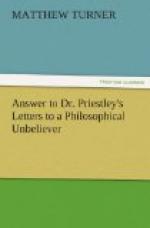What is there more which hinders a series of finite causes to be carried back ad infinitum, than that the reasoner or contemplator of the course of nature is tired. If this eternal series could not exist, a Deity might with some propriety be said to follow. Put the argument into a syslogistic form.
“The universe shews design;”
“It is absurd to suppose an infinite succession of finite causes;”
“Therefore there is an uncaused intelligent cause of this universe.”
Deny the second assertion and the problem is destroyed. So far from its being difficult to suppose an eternity, it is the most difficult thing in the world to suppose any thing but an eternity. A mind, not afraid to think, will find it the most easy contemplation in the world to dwell upon. It is at least a bold assertion, that nothing can be more evident than that plants and animals could not have proceeded from each other by succession from all eternity. Surely to this may be answered, that it is more evident that two and two make four. But Dr. Priestley goes on to say, “that the primary cause of a man cannot be a man, any more than the cause of a sound can be a sound.” Experience shews us all sound is an effect of a cause. Does experience shew us more of a man than that he came from a man and a woman? To allow therefore that all men must have come from a man and a woman is as far as we can argue upon the subject, whilst in reasoning we trust to experience. An argument is well built upon similarity, therefore it is probable if one horse had a cause all horses had. But will not the argument be more consonant to itself, in supposing all horses had the same cause, and as one is seen to be generated from a horse and a mare so all were from all eternity. It were a better argument in favour of a Deity or some invisible agent to shew that a new animal came every now and then into life, without any body’s knowing how or where.
It is allowed by Priestley and all other reasoners, that the most capital argument that can be formed in support of any thesis is to be built upon experience, or analogy to experience. Yet will many of these reasoners, Dr. Priestley at least for one, contend at the same time for the probability of a future life, when no instance can be given of any revival whatsoever. The same will contend, that their Deity can at pleasure form new species of animals, though in fact we never do see new beings come into existence. We ought only to argue from experience; and experience would teach us, that the species of all animals has eternally existed. Grant that we do not know, whether man has been eternal, or from a time, is it therefore because we do not know, that we must say he came from God? That unknown Being, as he is sometimes pompously and ridiculously called! The Devil is equally an unknown Being. The admission of evil under a good Deity opens a ready door to the manichean system, which seems much more rational than simple Deism.




